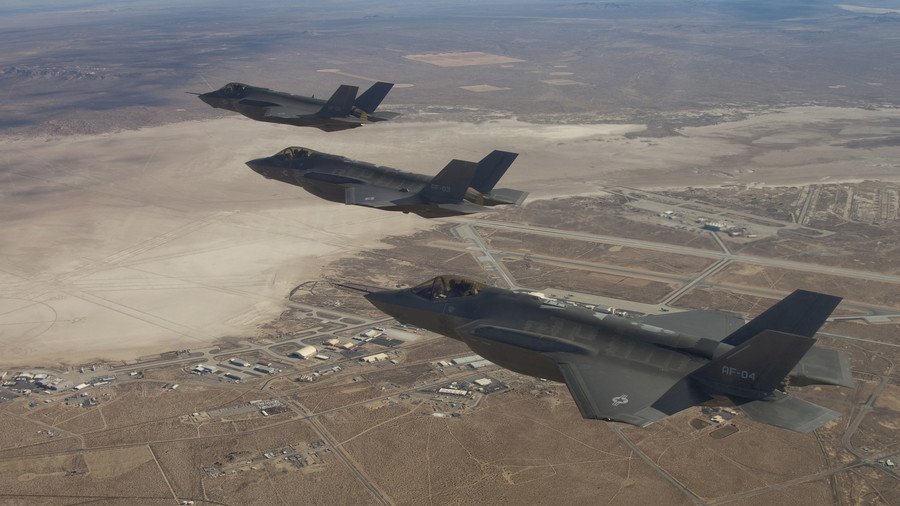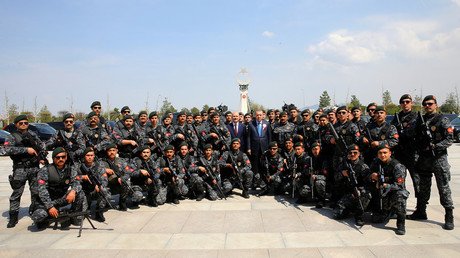‘Strategic partners? Don’t wrong us then’ – Erdogan tells US over plans to block F-35 sales

President Erdogan warned NATO ally the US that it should behave more like a strategic partner rather than place legal hurdles for Turkish arms deals. The remark was in response to US plans to block F-35 sales to Ankara.
“We say that the US is our strategic partner. As our strategic partner, the US should not say we should knock on another door,” Turkish President Recep Tayyip Erdogan said on Friday. Speaking to Turkish Star TV, Erdogan was referring to a bill recently introduced in the US Senate with the aim of halting the shipment of F-35 stealth fighter jets to Ankara. “If we are strategic partners, if we are model partners, the US should not legally wrong us here,” he said.
Turkey has ordered 100 American jets, and the first two units are to be deployed by 2019. The military spending bill, which is yet to be put up for a vote, is being pushed by senators from both the Republican and Democratic parties. It says that Ankara will not receive the promised aircraft and their maintenance depot if it “degrades NATO interoperability” and “exposes NATO assets to hostile actors.” The senators also do not want Turkey to get the planes if it tries to buy weapons from nations under US sanctions. Lawmakers also cited the detention of US citizens by Ankara and potential threats to Greece, another NATO ally, as reasons to stop selling fighter jets to Turkey.
The bill was introduced in the wake of Turkey’s plans to buy S-400 surface-to-air missile batteries from Russia. The deal was signed between Ankara and Moscow last December. The batteries were supposed to be shipped in 2020, but the date was moved forward to the summer of 2019, a senior Turkish government official confirmed in April.
The US State Department warned Turkey that it “should be mindful of the risks in making strategic concessions to Moscow,” and that the deal with Russia may “potentially” lead the US to impose sanctions on its ally.
The Turkish government denounced the bill as a breach of the “spirit of the alliance” between the two countries, warning that if the US warplanes are not delivered as promised, Ankara will explore other options elsewhere.
The row over the arms deal is the latest strain in US-Turkish relations, which have been deteriorating for several years. Ankara has heavily criticized the US for failing to hand over exiled Turkish cleric Fethullah Gulen, who the government blames for masterminding a coup attempt in 2016. The two nations have also clashed over Turkish military operations against Kurdish forces in Syria.
The US has put similar pressure on other countries seeking to acquire state-of-the-art Russian missile systems. Among them is India, which, like Turkey, concluded talks to buy the S-400, with a contract expected to be signed this year. On Tuesday, Chairman of the House Armed Service Committee William Thornberry told Indian media that the upcoming deal will “limit the degree in which the United States will feel comfortable” shipping arms into the country. India plans on sticking to the deal with Russia, the Hindustan Times reported on Friday, citing sources in the defense ministry. The Indian press says this move puts at risk a prior deal with the US on shipping American-made Predator drones.
Another potential buyer of S-400 missile systems, Qatar, reportedly received a harsh warning from its neighbor Saudi Arabia, who enjoys close ties with the US. According to French Le Monde, the Saudi king wrote a letter to the French president saying that the purchase of Russian-made missile systems by Qatar will jeopardize Saudi “national security,” and even threatened “military action” against Qatar if the deal takes place.
Like this story? Share it with a friend!
















